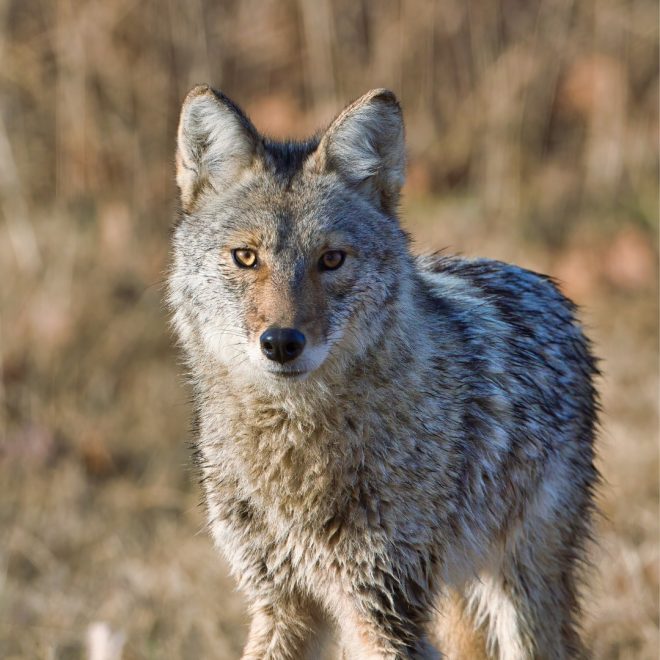
ALBERTA— WeHowl, Wolf Awareness, Animal Justice, Animal Alliance of Canada, Humane World for Animals Canada, Coyote Watch Canada and The Furbearers are celebrating a significant win for wildlife protection as Alberta Fish and Wildlife confirmed they have quietly ceased use of Compound 1080 to poison wolves, effective December 2024.
Compound 1080 (sodium monofluoroacetate) is an extremely toxic, non-selective chemical previously used in Alberta to poison wolves and coyotes. It also kills many non-target species. It continues to be used by farmers in Alberta intending to poison coyotes. Because Compound 1080 causes extreme suffering and death to animals who ingest poison baits and poisoned carcasses, its use has long been strongly condemned by both environmental and animal protection groups. Wolves, coyotes, and other animals who consume Compound 1080 baits experience extreme anxiety, frenzied behaviour, tetanic seizures, vomiting, and eventual death from cardiac failure or respiratory arrest caused by cell death and a lack of oxygen to the brain. Poisoned animals, including domestic dogs, can suffer for hours before dying.
“Ending the use of this horrific poison on wolves is an encouraging step forward, but our work isn’t finished yet,” said Sadie Parr, WeHowl. “Coyotes continue to be poisoned using Compound 1080, including on public land that is leased out for raising livestock. As long as it is on the landscape, wolves and other animals will also be poisoned.”
The announcement follows persistent advocacy efforts, a detailed statutory request to review the registration of both Compound 1080 and strychnine, scientific research, and extensive communications with the Alberta government and Health Canada’s Pest Management Regulatory Agency (PMRA).
The groups are calling on the federal government to protect all animals from this cruel and indiscriminate poison by banning Compound 1080 altogether.
“We commend Alberta for ending the use of Compound 1080 to poison wolves, and urge the province to take the next step by ending the poisoning of coyotes as well,” said Lesley Sampson, co-founding Executive Director of Coyote Watch Canada. “Like wolves, coyotes are sentient, intelligent and social animals who play an important role in Canadian ecosystems. We remain committed to advancing humane, non-lethal methods of protecting livestock.”
“The vast majority of Canadians want to see an end to the use of Compound 1080 to kill Canadian wildlife,” said Kaitlyn Mitchell, Director of legal advocacy with Animal Justice. “We urge Health Canada to permanently cancel the registration of all products containing Compound 1080, and for both levels of government to work with farmers to promote more effective and humane ways to prevent predation of cows and other farmed animals.”
In March of 2024, Canada cancelled all uses of the notoriously cruel poison strychnine, which was also being used in Alberta. At the time, a coalition of groups including WeHowl, Wolf Awareness, Animal Justice, Animal Alliance of Canada, Humane World for Animals Canada, and Coyote Watch Canada filed a Notice of Objection under the Pest Control Products Act, asking Health Canada to reverse course on its decision to continue registering the “super poison” Compound 1080. Advocates are pushing Alberta and the PMRA to end all predator poisoning programs permanently, emphasizing humane, science-based wildlife management alternatives.
For more information, please contact anyone from the coalition:
Animal Alliance of Canada: www.animalalliance.ca
Animal Alliance of Canada is a not-for-profit organization dedicated to advocating for the protection of animals and the environment through legislative reform, public education, and political action since 1990.
Liz White, Honourary Director: liz@animalalliance.ca
Animal Justice: www.animaljustice.ca
Animal Justice is Canada’s leading national animal law advocacy organization, dedicated to protecting animals through education, litigation, and legislative advocacy.
Kaitlyn Mitchell, Director of legal advocacy: kmitchell@animaljustice.ca
Coyote Watch Canada: www.coyotewatchcanada.com
Coyote Watch Canada is a community-based wildlife organization that advocates positive human wildlife experiences. It works to promote community coexistence through education, research, mediation, intervention, and conflict resolution.
Lesley Sampson, Co-founding Executive Director: info@coyotewatchcanada.com
Humane World for Animals Canada: www.humaneworld.org
Humane World for Animals Canada (formerly Humane Society International/Canada) is a leading animal welfare organization committed to protecting animals from cruelty and exploitation through advocacy, education, and hands-on programs.
The Fur-Bearers: www.thefurbearers.com
The Fur-Bearers is a charitable organization that works to protect fur-bearing animals through conservation, advocacy, research, and education.
Lesley Fox, Executive Director: lesley@thefurbearers.com
WeHowl: www.wehowl.ca
WeHowl is a national collective of organizations and individuals uniting to make positive changes for wolves and nature.
Sadie Parr, Founder: sadieparrwolfpact@gmail.com
Wolf Awareness: www.wolfawareness.org
Wolf Awareness is a Canadian non-profit dedicated to fostering positive attitudes toward wolves and wildlife conservation through education, advocacy, and research.
Hannah Barron, Conservation Director: hannah@wolfawareness.org
BACKGROUND OF THE ISSUE: Indiscriminate, Inhumane and Irresponsible: Compound 1080 Is No Longer an Acceptable Form of Wildlife Management